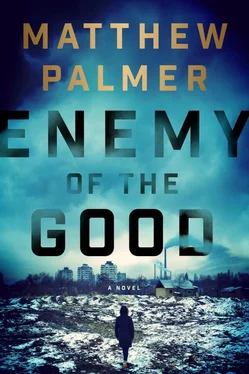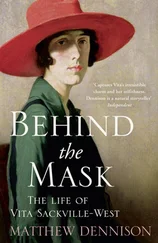“Anything, dear.”
“Valentina’s brother. Do you remember his first name?”
“Of course. It was Zhyrgal, dear. Zhyrgal Aitmatov.”
“Thank you, Mrs. Larson.”
_____
Half an hour later, Kate had the answer she was after. One of the private clinics had a resident patient named Zhyrgal Dobrynin. The clinic had no set visiting hours, but the nurse who ran the unit said Kate was welcome to visit anytime.
The next morning at nine o’clock, Kate pulled up in front of the NeoMed Clinic and parked her Touareg in the shade of an enormous walnut tree. The clinic was a converted stone villa in a residential part of Bishkek. From the outside it seemed pleasant enough, albeit in need of a little upkeep. Kate walked in through the glass doors carrying a shiny red gift bag she had picked up in the embassy commissary.
The nurse at the front desk was petite, brunette, and pretty, with features that could have been either Slavic or Kyrgyz, a product of the great Central Asian melting pot of cultures. The reception area was not fancy, but it was clean and there was a faint odor of antiseptic. This was a private clinic and Kate knew that it was considerably nicer than the state-run hospitals. Bishkek central hospital was a grimy, gray, cinder-block monolith where underpaid doctors and nurses treated patients like marks, shaking the families down for petty bribes for everything from appointment times to prescriptions.
“Welcome to NeoMed,” the nurse said pleasantly. She spoke in Kyrgyz. “How can I help you?”
The concept of customer service was just one more indicator that this was a private clinic.
“I’m here to see Zhyrgal Dobrynin,” Kate said.
“Are you a relative?”
“Friend of the family.”
“Can you please sign the log?”
The nurse pulled a bulky three-ring notebook off a shelf behind her and flipped through it quickly until she found the page she was looking for. She set it down in front of Kate.
Each resident evidently had an individual page in the log book. At the top of the page was the patient’s name—Zhyrgal Dobrynin—and a room number. Beneath that was a list of visitors with arrival and departure times. There were almost twenty visitor entries on Zhyrgal’s page, but all from the same person, a woman named Natasa Semirova. She visited Zhyrgal every Thursday in the early afternoon between two and three o’clock, as regular and dutiful as only family could be.
Zhyrgal’s room was on the second floor. Kate knocked softly on the door.
“Come in.” The voice was high-pitched and the words were slurred.
Zhyrgal was sitting in a padded wheelchair at the window looking out over the courtyard and gardens. His body was twisted and his limbs bent at unnatural angles. His face looked as though it had been crumpled in an accident, and a thin strand of saliva dangled from a corner of his mouth. His black hair was greasy. But there was a spark of intelligence and curiosity in his eyes that was unmistakable and instantly appealing.
“Hello, Zhyrgal.”
“Who are you?” The question was open and natural and not colored by suspicion. Kate could see that he had to strain to speak clearly.
“My name is Katarina. I’m a friend of your sister’s.”
Zhyrgal’s face tightened in what looked at first like a grimace. It took Kate a moment to realize that it was, in fact, a smile.
“A friend of Natasa,” he said, almost as though he were reminding himself of his sister’s name.
“Yes,” Kate agreed. “Natasa.”
She looked quickly around the room. The walls were a cheery yellow, but the paint was chipped and sun-faded in places. A hospital bed with a frame made from chunky aluminum tubing stood against one wall. There was a poster tacked over the bed featuring FC Dordoi, one of the big Bishkek football clubs. Football loyalty in Kyrgyzstan was a family affair and Val’s family had been Dordoi supporters.
Kate held up the bag she carried.
“I brought you a present.”
“I like presents,” Zhyrgal said.
“Who doesn’t?”
She pulled a white baseball cap with FC Dordoi’s blue-and-yellow soccer ball logo out of the bag.
Zhyrgal beamed.
“Would you like to try it on?”
“Yes, please.”
Kate put the cap on Zhyrgal’s head, adjusting it so that the bill would not block his view of the garden.
“You look great in it,” she said.
“I know.”
Zhyrgal’s laugh was more like a bark. His enthusiasm was evident and infectious.
“Do you mind if I visit with you a while?” Kate asked.
“I don’t know. I had plans.” He laughed again. Louder.
They talked for twenty minutes about football and the weather and the food in the clinic. It took a little practice to follow his slurred speech, but Kate realized quickly that the mind trapped inside his broken body was strong. She could not bring herself to ask directly about Valentina, to confront the fact that she was using Zhyrgal. Lying to him, in essence.
“Will I see you again?” Zhyrgal asked when Kate rose to leave.
“Most definitely.”
“When?” he demanded.
“On Thursday, Zhyrgal. I’ll be back on Thursday.”
7

Three days later, Kate was back at the NeoMed clinic. It had been a frustrating seventy-two hours. Kate had had little luck finding any other leads on Boldu and even less in getting cooperation from the CIA. Even her own boss in the political section seemed largely uninterested in Kate’s efforts to establish contact with Ruslan and the democrats. Nor had Kate seen much of her uncle since their dinner at the residence. He had been wrapped up in the base negotiations. The few times she had bumped into him in the embassy, he had been encouraging but vague and distracted, and Kate was left to wonder how much importance he really placed on the issue of Boldu. But why then had he pulled strings to get her transferred from Havana to Bishkek? Maybe it wasn’t because he really cared about a fringe democracy movement in a small country most Americans had never heard of. Maybe he was just looking out for his brother’s little girl. The poor little orphan. Kate hated that idea. She did not want to be condescended to. Under the best of circumstances, it would be hard enough in her field for people to see past her family name.
So it was with an edge of nervous tension that Kate approached the clinic. If Valentina did not show or if Natasa Semirova turned out to be someone else entirely, she would be back at the beginning.
At least she no longer felt like the bride of Frankenstein. The embassy doctor had cut her stitches out yesterday, and a little concealer and foundation helped make the angry red laceration at her temple much less noticeable. She would have a scar, but it was one that she would bear with pride.
The nurse at the reception desk seemed surprised to see her again so soon. Kate was disappointed to note that Semirova had not yet arrived. It meant little, however. She had timed her arrival at the clinic to coincide with the front end of the window in which Semirova had signed in on Zhyrgal’s page in the visitor book. There was no reason to be nervous, at least not yet. But Kate’s palms were damp and she wiped them surreptitiously on the cool metal desktop.
She made her way up to Zhyrgal’s room. He was happy to see Kate and he seemed to appreciate the bag with fruit, nuts, and chocolate that she had brought to share.
She peeled an orange for him. Watching him struggle to eat the fruit without making too much of a mess tugged at her heart. Kate had been struck in their earlier conversation by Zhyrgal’s positive attitude, his sense of humor, and his generous spirit. It was painful to see that potential trapped in a broken vessel. They talked about football and music. Zhyrgal was a big fan of Michael Jackson.
Читать дальше













